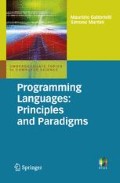Abstract
Abstraction mechanisms are the principal instruments available to designers and programmers for describing in an accurate, but also simple and suggestive, way the complexity of the problems to be solved. In a programming language, two classes of abstraction mechanisms are distinguished. That which provides control abstraction and that which provides data abstraction. The former provides the programmer the ability to hide procedural data; the latter allow the definition and use of sophisticated data types without referring to how such types will be implemented. In this chapter we will be concerned with the mechanisms for control abstraction. We will first discuss the concept of procedure (or function, or subprogram) and the notions of parameter passing methods and of higher-order functions. We will then tackle the concept of exceptions, that is exceptional conditions which can be detected and managed using protected blocks and handlers.
Access this chapter
Tax calculation will be finalised at checkout
Purchases are for personal use only
Preview
Unable to display preview. Download preview PDF.
References
J. W. Backus, F. L. Bauer, J. Green, C. Katz, J. McCarthy, A. J. Perlis, H. Rutishauser, K. Samelson, B. Vauquois, J. H. Wegstein, A. van Wijngaarden, and M. Woodger. Report on the algorithmic language ALGOL 60. Commun. ACM, 3(5):299–314, 1960.
M. Broy and E. Denert, editors. Software Pioneers: Contributions to Software Engineering. Springer, Berlin, 2002.
J. B. Goodenough. Exception handling: issues and a proposed notation. Commun. ACM, 18(12):683–696, 1975.
K. Jensen and N. Wirth. Pascal-User Manual and Report. Springer, Berlin, 1991.
M. D. MacLaren. Exception handling in PL/I. In Proc. of an ACM Conf. on Language Design for Reliable Software, pages 101–104, 1977.
J. Moses. The function of FUNCTION in LISP, or why the FUNARG problem should be called the environment problem. Technical report, MIT AI Memo 199, 1970. Disposable on-line at http://hdl.handle.net/1721.1/5854.
R. L. Sites. ALGOL W reference manual. Technical report, Stanford, CA, USA, 1972.
T. R. Virgilio and R. A. Finkel. Binding strategies and scope rules are independent. Computer Languages, 7(2):61–67, 1982.
N. Wirth. The programming language Pascal. Acta Informatica, 1(1):35–63, 1971. Reprinted in [2].
N. Wirth and C. A. R. Hoare. A contribution to the development of ALGOL. Commun. ACM, 9(6):413–432, 1966.
Author information
Authors and Affiliations
Corresponding author
Rights and permissions
Copyright information
© 2010 Springer-Verlag London
About this chapter
Cite this chapter
Gabbrielli, M., Martini, S. (2010). Control Abstraction. In: Programming Languages: Principles and Paradigms. Undergraduate Topics in Computer Science. Springer, London. https://doi.org/10.1007/978-1-84882-914-5_7
Download citation
DOI: https://doi.org/10.1007/978-1-84882-914-5_7
Published:
Publisher Name: Springer, London
Print ISBN: 978-1-84882-913-8
Online ISBN: 978-1-84882-914-5
eBook Packages: Computer ScienceComputer Science (R0)

